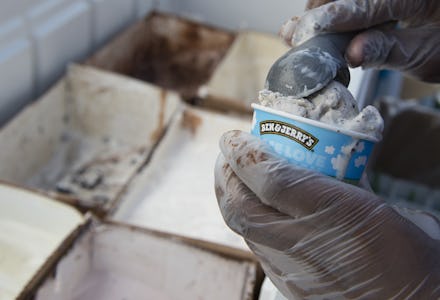Ben & Jerry's is supporting Black Lives Matter — but will it make a difference?

No — you won't find "Fudge the Police" or "Hands Up, Don't Scoop" Ben & Jerry's flavors in your local supermarket freezer aisle.
But the iconic ice cream brand this week joined activists around the country in proclaiming that "black lives matter."
Ben & Jerry released a pro-BLM statement online Thursday, and the company's tweet announcing its support was retweeted by the Black Lives Matter Global Network's Twitter account on Friday.
The announcement inspired a viral social media hashtag, #BenAndJerrysNewFlavor, which supporters have used to suggest new BLM-themed flavors — mostly tongue-in-cheek (and funny, if in a sad way).
Ben & Jerry's gesture is certainly powerful.
"Black lives matter," their statement begins. "They matter because they are children, brothers, sisters, mothers, and fathers ... [and] because the injustices they face steal from all of us — white people and people of color alike ... It's been hard to watch the list of unarmed black Americans killed by law enforcement officers grow longer and longer."
By supporting BLM, Ben & Jerry's sets itself apart as one of the first major corporations to officially back the pro-black social justice movement that grew to national prominence three years ago. And it's a bold move for a public brand, given that even the Democratic party has kept BLM at an arm's length.
But, at least right now, the statement is just that — a statement.
"In order for us to begin to create a society that is not built on a foundation of institutionalized racism, it requires us to admit that it exists," Chris Miller, Ben & Jerry's social mission activism manager, said in a phone interview Friday. "It is our hope that other companies will join us in acknowledging the issues that have been surfaced by the Black Lives Matter movement."
Now, this is not Ben & Jerry's first foray into racial social justice: In May the company announced it would donate proceeds from the sale of a voting rights-themed flavor, "Empower Mint," to the North Carolina NAACP's efforts in challenging voter ID laws that make ballot casting disproportionately more difficult for blacks.
The brand has also been praised for taking other progressive stances, including on issues of climate change and marriage equality.
But neither Ben & Jerry's nor its parent company Unilever is entirely without criticism on social issues. Ben & Jerry's courted controversy in February for its ties to an ice cream company in Israel.
And in 2010, Unilever's Vaseline caught heat after launching a Facebook app in India that encouraged users to whiten their skin in profile pictures.
Indeed, Unilever owns "Fair and Lovely" — a deeply problematic line of skin lightening products sold around the world.
Miller argues that Ben & Jerry's is able to deflect criticism because of its credibility on social issues: "When we speak, we speak on behalf of Ben & Jerry's, not Unilever," he said. "What has over the years given us the credibility is that we [take stances] in a way that shows integrity and sincerity."
But the less-savory products sold by Ben & Jerry's corporate parent are a good reminder: For the ice cream maker's latest move to be more than just PR, its pronouncement must be followed with real action — legislative advocacy or direct reparative work in black communities.
Cynical as it may sound, there might be an economic or financial argument for this kind of action, too: Founded in 1978, Ben & Jerry's was a pioneer among companies using social justice causes to define their brand, said Jason Saul, a professor in the Kellogg School of Management at Northwestern University.
"It used to be that, in the 1960s and '70s, companies gave back because it was the right thing to do," Saul said. "What Ben & Jerry's pioneered ... cultivated customer loyalty and differentiated the brand."
Today, corporations can actually measure how much support of a cause — like BLM — will influence consumer behavior, he said. Given stiff competition over price, quality and convenience across many brands, companies are jockeying for increased social value.
"The market is willing to reward companies for delivering a social value proposition," Saul said.
Of course, words are very different from actions — and creating the appearance of social value is not the same as actually delivering it.
Recently, whether for reasons of conscience or profit (or both, perhaps), other corporate leaders have also publicly endorsed BLM.
Last week, video clips emerged from an AT&T company meeting showing the telecom giant's CEO, Randall Stephenson, giving an unambiguous endorsement of BLM in front of a crowd of several hundreds of people.
Stephenson said personal alarm over police killings that sparked protests and civil unrest in North Carolina in September inspired his support.
"If this is a dialogue that's to begin at AT&T, I feel like it probably ought to start with me," he said, eliciting rousing applause from employees.
While Stephenson's tone was forceful and seemingly genuine, not all corporate forays into racial social justice come off so well.
In March 2015, Starbucks ended its racial justice campaign, "Race Together," after significant backlash from people who believed the coffee chain should not encourage its baristas to start awkward, sensitive dialogue with customers standing and waiting for a cup of joe. The campaign lasted about one week.
Since Thursday, Ben & Jerry's has also received some backlash from members of the public who said the company should "stick to ice cream," Miller said.
"Anytime you sort of stick your head up on an issue that is controversial, there will be people who swing for it," he said. "We're completely comfortable with that."
Plans to support BLM — beyond just the statement — are in the works, Miller said.
Correction: Oct. 7, 2016